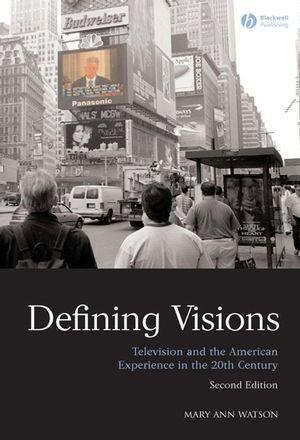Defining Visions: Television and the American Experience in the 20th CenturyISBN: 978-1-4051-7053-6
Paperback
310 pages
January 2008, Wiley-Blackwell
 This is a Print-on-Demand title. It will be printed specifically to fill your order. Please allow an additional 10-15 days delivery time. The book is not returnable.
Other Available Formats: Hardcover
|
||||||
“Once again one of our most eminent broadcast historians
has produced a work that is both good history and good reading, and
a brilliant and analytic integration of sources – many of
them mined from heretofore unavailable material. This elegant
history of television is a study of the box that changed history
and its changing status in the era of the web with implications for
democracy and society writ large.”
Everette E. Dennis, Fordham Graduate School of Business, New
York
“A really good book about the history of American
television would, by necessity, also be a book about all of the
most important social and cultural themes of the last half of the
twentieth century. Defining Visions is that really good
book.”
Robert Thompson, Newhouse School of Public Communication,
Syracuse University
Praise for the first edition of Defining Visions:
“Cogent and discerning assessment ... .A comprehensively
revised second edition … . As one of our most astute media
observers, Watson makes an estimable case.”
Television Quarterly
"[Defining Visions] is a beautifully-written, textured
analysis of American television. Watson has produced good history
and good analytic integration of sources and original
observations..."
Everette Dennis, Felix E. Larkin Distinguished Professor of
Communications and Media Management, Fordham University
"Watson's Defining Visions ably introduces the reader to
television culture in an informative, often entertaining manner.
....Watson might well join the ranks of authors Neil Postman and
Erik Barnouw...attracting those within and outside the academy. As
it stands, Defining Visions will most likely find a receptive
readership among undergraduates."
Robin R. Means, Journal of Popular Film &
Television
“Especially versatile for teaching the influence of
television on race, class and gender and presents a rich background
for examining violence, advertising, character and
democracy.”
The Docket
"This refreshing approach--devoid of cultural
studies--has an important strength: in revealing television as a
powerful part of American life, not just an idle preference, it
presents youthful readers with a view that contrasts with much they
have heard about television. The book delights with its engaging
style."
-R.W. Morrow, Morgan State University



